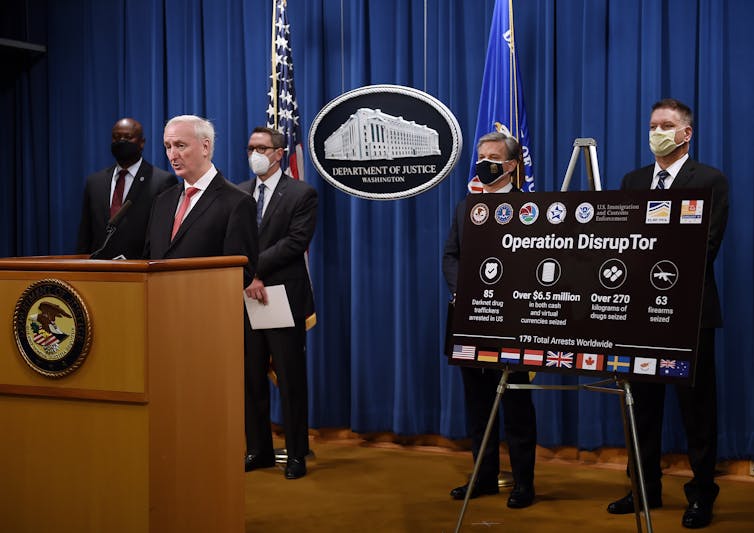Source: The Conversation (Au and NZ) – By Chris Wilkins, Associate Professor of illegal drug research, Massey University

Getty Images
New Zealand is generally proud of being a world leader, but there’s one claim that might not be universally admired: being home to the longest running English-language market for illegal drugs on the so-called “darknet”.
Known as “Tor Market”, it has been active since March 2018 and has outlived several larger and better known operations such as “Dream Market”, “Hydra Market” and “Empire”. The longevity of Tor Market is surprising, given so many darknet drug markets have only lasted relatively briefly.
That doesn’t mean you’ll be able to find it easily. The darknet is an encrypted portion of the internet not indexed by search engines. It requires specific anonymising browser software to access, typically I2P or Tor software – hence the local market’s name.
Many darknets sell illegal drugs anonymously, with delivery by traditional post or courier, and resemble legal e-commerce sites such as Amazon.
An analysis of over 100 darknet markets between 2010 and 2017 found sites were active for an average of just over eight months. Of the more than 110 darknet drug markets active from 2010 to 2019, just ten remained fully operational by 2019.

Getty Images
The fragmented darknet ecosystem
Darknet marketplaces have disappeared as a result of increasingly sophisticated and successful law enforcement operations, including clandestinely taking over sites for extended periods to gather evidence on vendors and buyers.
Alternatively, site administrators pull off opportunistic exit scams and abscond with cryptocurrency held in accounts.
No dominant international darknet market has emerged since the “voluntary shut down” of Dream Market in 2019. And there appears to be a general loss of confidence in darknet drug supply due to those enforcement shutdowns and exit scams.
Read more:
The darknet is not a hellhole, it’s an answer to internet privacy
While total sales on all darknet markets increased in 2020, and again in the first quarter of 2021, data for the fourth quarter of 2021 suggest sales declined by as much as 50%.
This makes Tor Market’s performance over the same period even more remarkable. Its listings grew from fewer than ten products in the months prior to Dream Market’s closure in early 2019 to over 100 products by July that year.
After a steady period where there were, on average, 255 listings across 2020 and 379 across 2021, another period of growth happened in early 2022. This saw over a thousand products being listed on Tor Market by mid-2022 (see graph below).
This expansion was driven by a steady increase in international sales, which grew to outnumber domestic New Zealand sales by early 2022.
Filling a market gap
On the face of it, New Zealand may seem an unlikely location for a rising international darknet drug market. Its geographical isolation from large European and US drug markets, small population, and historical absence of any substantial cocaine and heroin supply should all work against it.
Yet these factors may be exactly what has driven this market innovation.
Darknets provide anonymous and direct access to international drug sellers who have MDMA, cocaine and opioids for sale – drug types not easily accessed in physical drug markets in New Zealand. These international sellers are otherwise unlikely to have any interest in supplying such a small, distant market.
Read more:
Inside a ransomware attack: how dark webs of cybercriminals collaborate to pull them off
By providing offerings from dozens of international drug sellers and a centralised forum for buyers, Tor Market solves the very real economic problem of “thin markets” in the New Zealand drug scene, where there are simply not enough buyers to sustain sellers for some drug types.
Usually, buyers and sellers would have trouble connecting and hence justifying large-scale international trafficking. Darknets solve this problem by offering retail quantities of drug types that are traditionally difficult to source, such as MDMA, directly to buyers.
Size and scrutiny
New Zealanders have a history of innovative solutions to the so-called “tyranny of distance”. They also have a relatively high level of digital engagement and online shopping habits by international standards. Perhaps darknets offer a familiar online shopping experience.
For their part, the Tor Market administrators claim (based on their own site’s help manual) to offer a range of design innovations and features that ensure the security of Tor Market.
This kind of boasting is not uncommon among darknet operators as a marketing strategy to attract new vendors to a site. And it’s not clear whether Tor Market is really offering any superior security features or coding infrastructure compared to other sites.
More credible is Tor Market’s purported business strategy of purposely seeking to maintain a low profile compared to larger international sites. Indeed, many of the vendors on Tor Market in the early days were New Zealand-based and who only sold to local buyers.
The rising international listings on Tor Market may reflect wider problems in the darknet ecosystem, including the closure of previously dominant darknet markets and the unreliability of many sites due to denial-of-service attacks.
In the end, Tor Market’s success may be its undoing. It remains to be seen whether it can sustain its international growth and operate with a higher international profile, given the related risk of international law enforcement looking its way.
![]()
Chris Wilkins and Marta Rychert receive funding from the New Zealand Royal Society Te Apārangi Marsden Fund Grant MAU1812.
Marta Rychert receives funding from the New Zealand Royal Society Te Apārangi and NZ Health Research Council.
– ref. The dark web down under: what’s driving the rise and rise of NZ’s ‘Tor Market’ for illegal drugs? – https://theconversation.com/the-dark-web-down-under-whats-driving-the-rise-and-rise-of-nzs-tor-market-for-illegal-drugs-191658







